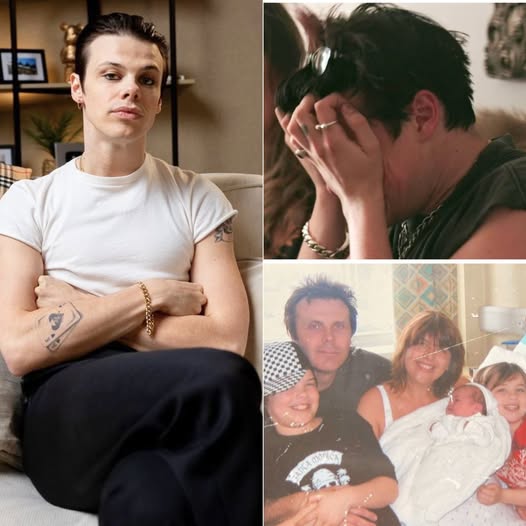💔 “My family went bankrupt, and I was bullied for the weird way I thought and acted.”
Behind the neon chaos of Yungblud’s concerts and the raw defiance of his music lies a story most fans only glimpse in fragments. While today he’s hailed as one of the most electrifying performers of his generation, his journey was anything but easy. His rise is not just about music — it’s about survival, resilience, and the power of transforming pain into a movement that speaks to millions who’ve felt like outsiders.
This is the story of how a boy marked by bankruptcy, bullying, and alienation grew into Yungblud: the artist who turned “being different” into an anthem.
A Childhood Shaped by Struggle
Yungblud, born Dominic Richard Harrison in Doncaster, England, did not grow up with the stability many imagine rock stars come from. His family faced financial collapse, and with it came the weight of uncertainty, embarrassment, and constant stress. For a child, bankruptcy isn’t just about losing money — it’s about feeling like the world you thought was safe is suddenly fragile.
As if that weren’t enough, young Dom faced bullying from peers who couldn’t understand him. He thought differently, acted differently, and expressed himself in ways that didn’t fit the mold of what was “acceptable” in school hallways. That difference — the spark of creativity and individuality — made him a target.
Instead of encouragement, he was ridiculed. Instead of support, he was told to conform. These moments planted the seeds of defiance that would later explode on stage in the form of Yungblud’s unrelenting energy.
The Turning Point: Refusing to Break
For many, bankruptcy and bullying could have created a cycle of shame and silence. But for Yungblud, it became fuel. Every taunt, every sneer, every whispered insult carved into him the conviction that he would not be silenced.
He realized that the very things that made him “weird” were his superpowers. His boundless imagination, his sensitivity, his refusal to fit into society’s neat little boxes — all of these became weapons in his creative arsenal.
Rather than caving under the pressure to conform, Yungblud began to dream bigger, louder, and with more color than ever before.
Building a World Where Outsiders Belong
One of the most powerful elements of Yungblud’s artistry is that his music is never just about himself. Sure, his lyrics often stem from personal experiences — heartbreak, confusion, rebellion — but he crafts them into messages that resonate universally.
Every performance is more than entertainment. It’s a sanctuary. For fans who have felt bullied, dismissed, or misunderstood, stepping into a Yungblud show is like entering a parallel world where the rules are rewritten. Here, vulnerability is strength. Difference is celebrated. Pain is not hidden but shared, transformed into something empowering.
What sets Yungblud apart is that he doesn’t just preach this message; he lives it. He makes eye contact with fans, holds conversations online, and creates spaces where his audience feels seen. His shows are anthems of unity — loud, messy, and unapologetically real.
Music as a Safe Space
From the start of his career, Yungblud’s songs have been raw, unfiltered reflections of his own struggles. Tracks dealing with identity, mental health, and social alienation aren’t just catchy — they’re lifelines for listeners navigating similar storms.
To many, his music feels like someone finally saying the words they were too scared to speak aloud. When he screams into the mic, fans scream with him, releasing years of bottled-up pain. When he sings about love, loss, or defiance, it isn’t abstract. It’s visceral. It’s lived.
That’s why his fans, affectionately called “the Black Hearts Club,” feel more like a community than just a fanbase. It’s a collective built on shared wounds and shared healing, where music is therapy, and concerts are group sessions of catharsis.
From Pain to Power
The transformation of Yungblud’s story is not just about personal triumph. It’s about what happens when you take trauma and use it to build bridges rather than walls.
Financial hardship taught him empathy. Bullying taught him the importance of creating safe spaces. Alienation gave him the desire to build community.
He didn’t just rise above his circumstances — he built a career on embracing them. His success isn’t in spite of his struggles; it’s because of them.

This is what makes Yungblud so magnetic to his fans: his authenticity. He doesn’t wear a mask on stage; he rips it off. He shows his scars, and in doing so, gives others permission to show theirs.
The Message That Resonates
At its core, Yungblud’s journey carries one simple but powerful message:
💡 Being different is not something to hide. It’s something to celebrate.
For anyone who has been told they don’t fit in, his music is proof that not fitting in might be the greatest strength of all. He represents the idea that identity is fluid, creativity is limitless, and authenticity is the ultimate rebellion.
Every tattoo, every shout, every frantic leap across the stage is a reminder: the world belongs to the misfits just as much as it belongs to anyone else.
Why Yungblud’s Story Matters Now
In an age where social media amplifies both connection and cruelty, young people face pressures previous generations could barely imagine. Cyberbullying, the pursuit of perfection, the weight of constant comparison — these are daily realities.
Yungblud’s story resonates because it speaks directly to this generation’s battles. He doesn’t stand on a pedestal above his fans; he stands with them. He knows what it feels like to be mocked, to feel like you don’t belong, to question your worth. And he offers his art as both a mirror and a lifeline.
In a cultural landscape often dominated by polished façades, his raw honesty is revolutionary.
The Evolution of a Movement
What began as one boy’s refusal to conform has grown into a movement that spans continents. From small clubs to massive festivals, Yungblud’s performances are marked by the same fire: a promise that no one in the room is alone.
He’s not just shaping music; he’s shaping culture. By giving outsiders a voice, he’s redefining what mainstream looks like. He’s proving that vulnerability can sell out arenas, and that authenticity can topple expectations.
The movement is not about perfection. It’s about permission — the permission to exist fully, unapologetically, and loudly.
The Legacy of Turning Pain Into Purpose
Looking back, it’s staggering to imagine that bankruptcy and bullying could have derailed this story before it even began. Yet Yungblud’s trajectory shows us something crucial: pain is not the end of the story.
For him, pain became power. It became art. It became a movement that now supports thousands who once felt alone.
And in the process, he’s teaching us all a lesson: the very things we think will break us might one day be the foundation of our strength.
Conclusion: The Anthem of the Outsiders
Yungblud’s story is more than a biography. It’s an anthem. It’s the sound of resilience, of defiance, of belonging. It’s proof that bankruptcy doesn’t define you, that bullying doesn’t silence you, and that difference doesn’t diminish you.
Instead, difference can become the fuel for a revolution.
Behind the flashing lights and explosive energy is a kid from Doncaster who once thought he was too weird, too loud, too much. Today, he is all those things — and that’s exactly why he’s unstoppable.
For anyone who has ever felt out of place, Yungblud’s message is clear: you are not alone. Your pain is valid. Your voice matters. And your difference is your superpower.
So when the crowd sings with him, arms in the air, screaming words that feel like salvation, it isn’t just a concert. It’s a reminder that from the darkest struggles can rise the brightest lights.
And for Yungblud, that light is only getting stronger.


